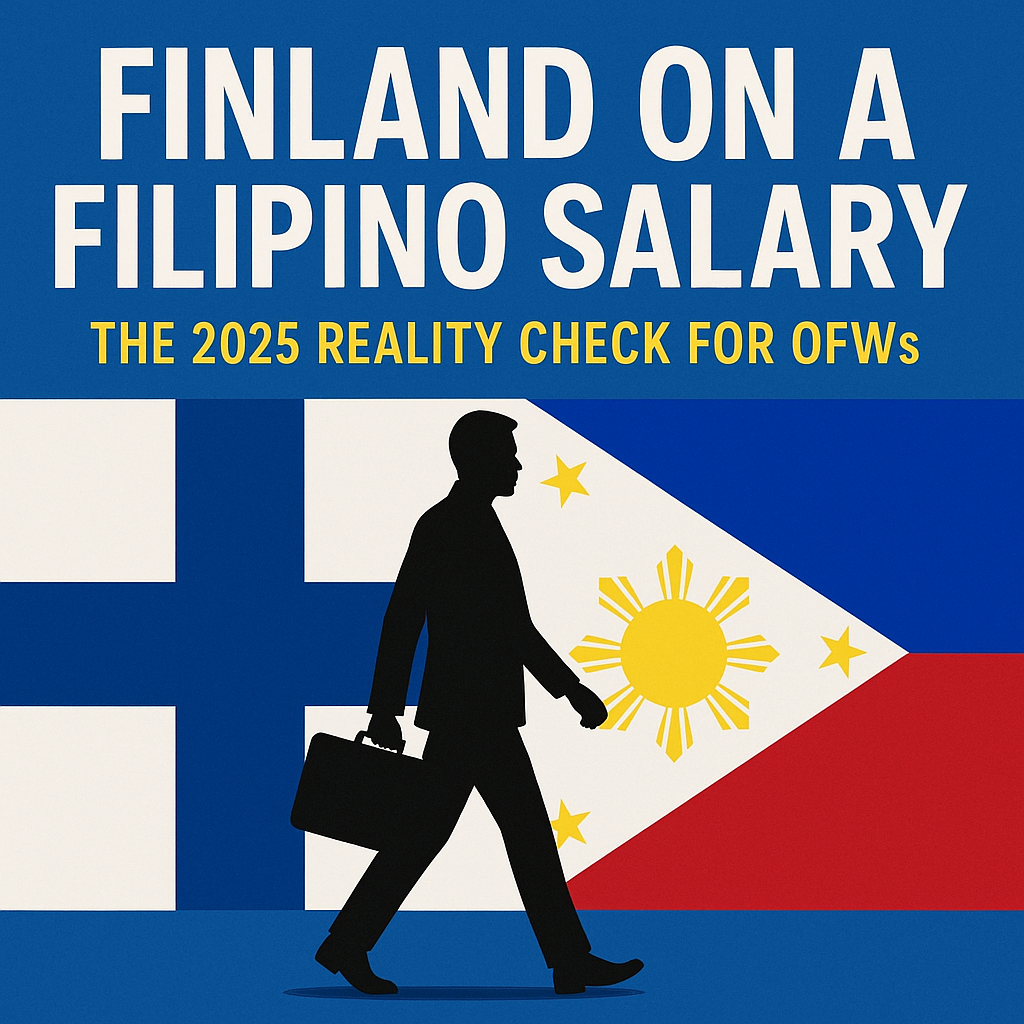




The moment the plane doors open at Helsinki-Vantaa Airport, the crisp Nordic air carries more than just the scent of pine trees—it brings the first tangible awareness of Finland's infamous cost of living. For newly arrived Filipino workers, that initial deep breath often coincides with their first price shock, whether it's the €5 airport coffee or the €30 taxi fare into town. This financial awakening begins a complex balancing act between Nordic wages and Philippine obligations that defines the OFW experience in Finland.
The Salary Illusion
On paper, Finnish wages appear transformative. A certified nurse from Manila might see their monthly earnings triple overnight, jumping from ₱25,000 at a private hospital to €3,000 gross (about ₱180,000) at a Helsinki healthcare center. The euphoria lasts exactly until the first payslip arrives, revealing the Nordic reality—a 32% tax bite that leaves €2,040 net, followed by mandatory pension contributions and union fees that shrink take-home pay further.
The collective bargaining system creates curious disparities. A restaurant cook in Turku might earn €2,200 gross while their Helsinki counterpart receives €2,600 for identical work—a geographic premium that barely covers the capital's higher rents. Overtime, that reliable Philippine salary booster, becomes rare in Finland's rigidly regulated labor market, where employers face steep penalties for exceeding 40-hour workweeks.
The Non-Negotiable Expenses
Housing emerges as the great budget devourer. That €900 studio apartment in Helsinki's outer districts requires not just first month's rent but a security deposit equal to three months' payment—a €3,600 upfront cost that drains savings accounts. Filipino workers quickly learn to decipher rental listings' coded language: "charming" means tiny, "cozy" translates to minuscule, and "character" signals aging infrastructure. The alternative—shared housing—comes with its own cultural adjustments, like navigating Finnish flatmates' legendary respect for personal space.
Winter exacts its own financial toll. The proper insulated jacket that costs ₱8,000 in Manila carries a €250 price tag in Helsinki shops. Even second-hand options from flea markets rarely dip below €120. Heating bills from November through March add another €150 monthly surprise, while studded winter tires—legally required in some regions—can consume an entire paycheck at €400-€600 per set.
The Filipino Food Dilemma
Grocery shopping becomes an exercise in culinary compromise. Staples like rice and soy sauce carry 300% markups at Asian specialty stores, forcing difficult choices. That 5kg bag of Jasmine rice at €18 means sacrificing two weeks' worth of fresh vegetables. Some inventive OFWs have started "ingredient collectives," pooling orders directly from Philippine suppliers to fill shipping containers—a system that brings down costs but requires months of advance planning.
Dining out follows different math. While a fast-food meal costs €10-€12 (comparable to Manila's nicer restaurants), the real budget killer is the unspoken social tax. Finnish workplaces' after-hours culture often revolves around bars where a single beer costs €8-€10—making participation in team bonding events a financial calculation rather than a simple social choice.
The Hidden Costs of Being OFW
Remittances take on new complexity in Finland's high-cost environment. Sending €300 home—a modest sum by Gulf OFW standards—represents 15% of a service worker's net pay after essential expenses. Many resort to "layered sending," transferring smaller amounts more frequently to avoid triggering bank fees.
Visits home become strategic operations. The €1,200 peak-season airfare requires either skipping Christmas reunions or accepting brutal 36-hour transit routes through the Middle East. Those who do return face the cultural expectation of pasalubong—where €200-€300 in Finnish chocolates and cosmetics becomes an unavoidable family tax.
Professional certifications present another financial hurdle. A nurse's license conversion costs €350 in fees alone, not counting the mandatory Finnish language exams at €180 per attempt. Many OFWs find themselves trapped in caregiver roles for years while slowly saving for the tests that would qualify them for higher-paying staff nurse positions.
Survival Strategies from the Pinoy Community
Helsinki's growing Filipino network has developed ingenious workarounds. The "snowflake budget" system—named for Finland's winter trademark—helps newcomers allocate funds:
50% for essentials (housing, utilities, insurance)
20% for groceries and necessities
15% for remittances
10% for savings
5% for unexpected winter costs
Seasoned OFWs share hard-won tips: buying winter gear during summer sales, using city bikes instead of buses in warmer months, and tapping into Finland's extensive second-hand markets for household items. Some have turned cultural skills into side income—offering Filipino cooking classes or tutoring Tagalog to Finland-born Filipino children.
The Long-Term Equation
After the initial two-year adjustment period, the financial picture begins to brighten. Those who achieve language fluency and local certifications see salary bumps of 20-30%. Permanent residency after four years unlocks lower loan rates for housing. The children of OFWs access Finland's free university education—a generational wealth transfer that changes family trajectories.
What begins as a struggle for daily survival gradually transforms into something unexpected—not just financial stability, but a redefined relationship with money itself. The same system that initially felt oppressive reveals its quiet logic: healthcare that doesn't require emergency savings, public transport that actually works, and the novel realization that a 40-hour workweek leaves time for living.
The midnight sun of a Finnish summer eventually illuminates what OFWs couldn't see during those first dark winters—that they're not just earning euros, but building a life where time and peace of mind carry their own currency. The numbers on receipts still sting, but the balance sheet of life acquires new columns measuring things no remittance can buy: safety that lets children walk home alone, parks clean enough for picnics without blankets, and the quiet confidence that comes from knowing a society's systems actually function as promised.
Finland never pretended to be cheap—just worth it. For Filipino workers who persevere beyond the initial price shocks, that calculus eventually adds up.
Please log in to leave a comment.
No comments yet. Be the first to comment!